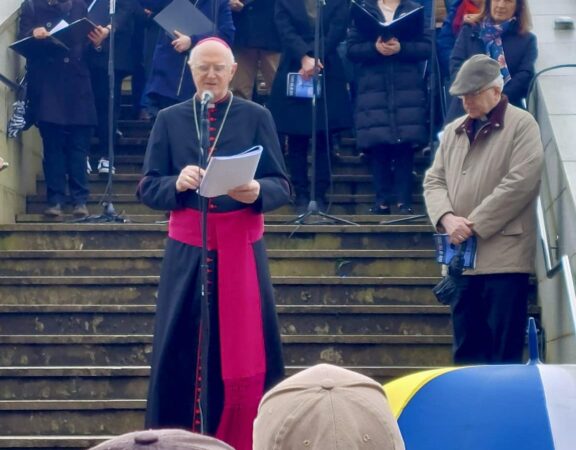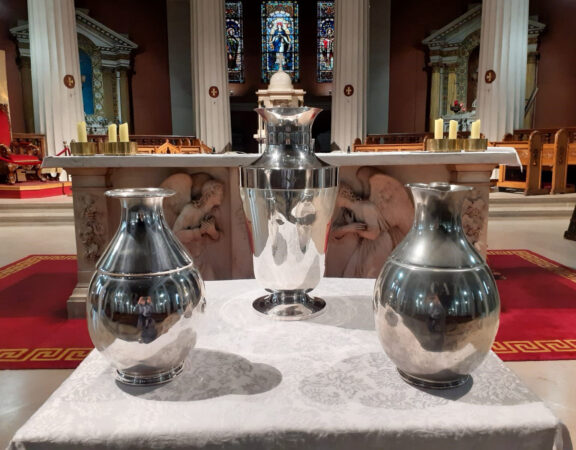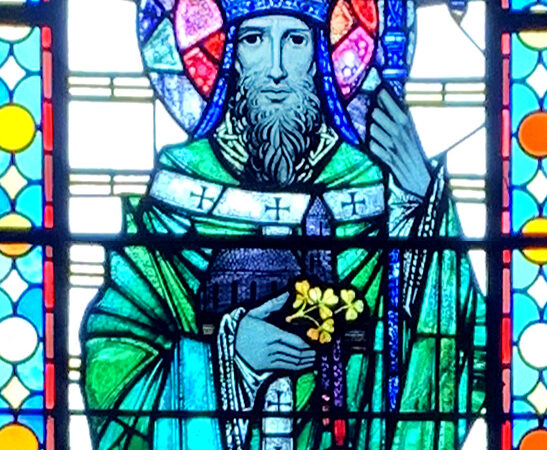Trinity College Historical Society
EVENT IN HONOUR OF ARCHBISHOP DESMOND TUTU
EVENT IN HONOUR OF ARCHBISHOP DESMOND TUTU
Speaking Notes of
Most Rev. Diarmuid Martin
Archbishop of Dublin and Primate of Ireland
———-
Trinity College, Dublin, 17th February 2009
Most Rev. Diarmuid Martin
Archbishop of Dublin and Primate of Ireland
———-
Trinity College, Dublin, 17th February 2009
“That thanks are due to the Auditor for his Address”. Thanks are indeed due to the Auditor, for his address and for this event. I am honoured by his invitation to be part of such a significant event to honour Archbishop Desmond Tutu and an event dealing with the role of religion in the public square.
Archbishop Desmond perhaps you are not aware that, in the past, it had not been the custom of Roman Catholic Archbishops of Dublin to address this society or even to frequent this University. Indeed the main aim of my predecessors for many years was to protect the younger members of their flock from the dangers to their faith which they could experience in the environment of these halls.
You will be glad, however, to know that times have changed. That said, I hasten to add that there are probably some who would say that times have changed in that the atmosphere of any of our universities is such as to constitute a danger to the faith of good Catholics and indeed that Trinity College may be the lesser of the evils among our universities which have today becomes bastions of relativism, of indifference and of agnosticism.
The first thing I have to say is that I for one do not feel under attack being present here at this debate. Nor would I feel that I should shield the younger members of my Catholic flock from the atmosphere of this or any university. Faith cannot be imposed. Faith must be nurtured and protected, but within real life. Faith cannot be relegated to the protective atmosphere of an isolated glasshouse. In today’s world, a strong faith can only develop within the public square, in a challenging debate and dialogue with the realities of life and progress, with the physical and the human sciences, and indeed with the concrete realities and experiences of the individuals and the interactions of individuals who make up society.
The danger to the faith of young people in Ireland is due, in my opinion, as much to the inadequacies of the Church’s efforts at evangelising, as to the dominant atmosphere of university culture or Irish culture in general.
Faith and religion have played an enormous role in the development of the identity of Ireland and the Irish. Ireland has and has had its currents of belief and good living, of faith and good works and generosity, of clericalism and anti-clericalism, as well as of intolerance, bigotry and religious small-mindedness. I am constantly struck by the level of insecurity in the lives of some people which their religious formation has engendered, something which I find hard to reconcile with the freedom Christian belief should bring.
When faith becomes an ideology then it looses its true identity. When a particular form of faith becomes a dominant ideology then it can transformed against itself and can deceive itself into believing that outward conformity means true assent and commitment, while it is simply conformity, perhaps even with a hidden resentment at being conformist which can at any moment easily explode into aggressive rejection.
I speak naturally in particular about the situation of Roman Catholicism today in an Ireland which is already marked by religious pluralism. Roman Catholic culture too is pluralistic.
Ireland is still in a period of transition regarding its attitude towards religion. I am at times tempted to think that my task would be easier if we lived in a more secularised country, where there was no need to pretend a type of religious veneer as a form of external social trapping. Would it be better if people would only bring their child for baptism as a true act of faith rather than as a social gesture? Would that not make it clearer to all what baptism and Church membership were about? Curiously much of secular Ireland is not yet ready to separate itself so definitively from religion and in reality there are various layers of faith and sense of belonging to the Church.
There are however thresholds beyond which it would be best for Church and society to recognise when religious rites were being used predominantly as social veneer.
The Church in Ireland is in transition to a new and a different form of presence in Irish society. Irish people love to talk about religion; they are still open to faith and indeed welcome expressions of faith and the witness of people of faith. Such expressions can be surprising. You have no idea how many people have spoken to me of the walk from Cobh to Dublin of Father Mernagh in atonement for the sexual abuse of children within the Church. There was in his gesture an element of integrity which struck a cord in so many people. You have no idea how many people have stopped me on the streets or at public places saying how that event, and the fact that I was at the Pro-Cathedral here in Dublin when he arrived, struck their children
What is clear to me is that young people in search for faith or in dialogue or even in conflict with the concept of faith, judge individuals and religious institutions in terms of integrity. They may feel little identity or affinity with institutional expressions of religion, but they can respect the personal integrity of those who belong to the institution or even those who have leadership within institutions. If however they perceive the Church as an institution standing up for its own institutional interests, then they will be unmerciful in their rejection and hostility.
I remember observing the role of religion in the political scene in South Africa over the years. There were figures of witness and conviction like Archbishop Tutu, like the leaders of the South African Council of Churches, like Archbishop Denis Hurley and other Roman Catholic leaders, who gave a clear personal prophetic witness to what was the right direction to take. There were also those who I call the leaders by conversion, like some prophetic leaders of the Dutch Reformed Church who were able to rise above the isolationism and prejudice of their narrow interpretations of scripture and allow themselves to be changed and then to bring their communities with them.
But the Church is not just its leaders. I remember on one occasion when the then Roman Catholic Archbishop of Capetown, Archbishop Naidoo, was asked: what was the principal contribution which the Church could bring to South Africa at a critical time? He responded: the principal contribution of the Church is being Church, that is, being a sign within the community of the unity of all people in Jesus Christ. And he hastily added: unfortunately we are not that, the members of our Churches are as divided as others in society. .
For the Church to witness in society to the values which underlie the Christian faith, then Church communities must be credible witnesses in their own lives and interaction to those values. They must witness to integrity. They must respect the autonomy of Caesar by witnessing to all to what it means to render to God what is God’s. They must witness to the transcendence of God and the change which this brings to the way people live and understand interaction among people as Children of the one God and thus as brothers and sisters.
Realising that God is transcendent influences the way we look at the imminent, at the day to day realities of life. Let me take an example. There are those who would use the concept of creation as a way in which to reject reason and science through narrow creationism, whereas the striking thing about a doctrine of creation is the fundamental affirmation that our world and life itself are gift; they are not our absolute possession and cannot be used for our own whim or interest, and therefore the fundamental value in life is never self-aggrandisement or possession or power or celebrity, but responsibility and solidarity and care, respect and stewardship for every aspect of God’s creation. In this sense rendering to God what is God’s involves the Church reminding Caesar not to act as God, whether Caesar’s power is political or economical or financial.
An understanding of life and the world as gift should also ensure another of the characteristics which will give credibility to the Church and church leaders: humility and the absence of any trace of personal arrogance, something which was not always a characteristic of the Irish Church and its leaders. Let us never forget that the tragedy of the sexual abuse of young people by Church personnel was also an expression of an arrogance of power.
The future of religion in the public square of today’s Ireland depends on the question of integrity. The danger in Ireland is that the Church might be tempted by a widely secularised society which still lives with vestiges of faith, to reduce its task to being type of religious veneer, a Church which speaks of God but which would be tolerant of everything, a “feel-good religion”. Jesus did not come to make people feel good, but to challenge them about the good and the truth. The Church’s greatest contribution to the world of Caesar will come through it being authentic and demanding and uncompromising in its presentation of the things of God.
There is one aspect of faith which perhaps more than any other people today find difficult. That is the concept of obedience. For many, a Catholic education did not give us a true understanding about what religious obedience is about. It is not about a docile response to any form of authoritarian expression. It is obedience to the Word of God. This is the task of everyone in the Church: lay person, priests, Archbishops, Popes. The Christian faith is about openness to the Word of God which demands change in the way we live. It is about openness which does not replace personal freedom and autonomy, but which determines the manner in which we use freedom. Obedience is not simply about the affirmation of commandment, but rather of fully understanding the basic commandment of love, which is not simply a feeling of being benign towards all, but one which would demands responding to a God of love through a radical response of love, a love that can transform human relationships.
“Thanks are due to the Auditor for his Address”. Thanks to you Archbishop.









